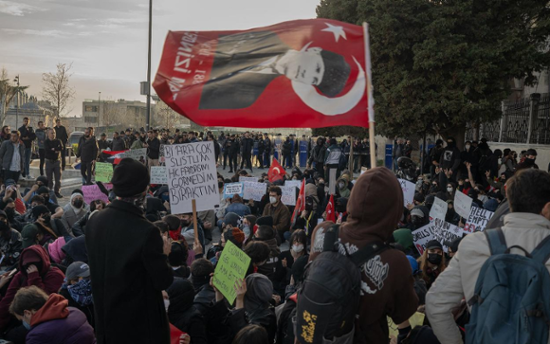For President Erdogan, success abroad but protests at home

By Aditi Bhaduri
Turkiye has been witnessing widespread protests, on a scale not seen in more than a decade, following the arrest of Istanbul mayor Ekrem Imamoglu on charges of corruption. Authorities have detained more than 1500 people, including many journalists covering the protests. A BBC reporter has even been deported from Turkiye. The opposition Republican People’s Party (CHP) led by Ozgur Ozel has called for mass protests in Istanbul on Saturday and called for early elections.
Authorities have taken a hard line stance against the protests, with riot police using water cannons, pepper spray, and rubber bullets to disperse people. The arrest came just days before the party’s presidential primaries and the arrest may be counterproductive as, defying protest bans, thousands came out yo vote for Imamoglu. They also demanded earlier electi9ns. Officially, Turkiye would go to the polls in 2028.
President Rajib Tayyip Erdogan has denouncing the rallies, labeling them “street terror.” “Those who spread terror in the streets and want to set fire to this country have nowhere to go. The path they have taken is a dead end,” he said.
The protests and demonstrations could throw a spanner in the works, just when Erdogan was riding on the crest of a foreign policy high. He had just secured a huge foreign policy victory in Syria, a vindication of its more than a decade position on the Syrian Civil War. With the ouster of Badhar Al Assad, Turkiye’s protégé Mohammed Al Sharaa has been ensconced in Damascus. In the Ukraine conflict Turkiye has deftly balanced its relations with both Russia and Ukraine, benefitting from both. It has gained a firm foothold in the South Caucuses by helping Azerbaijan achieve a resounding victory over arch rival Armenia in the Karabakh war and has played a successful role in the Somalian civil war, and is playing a defining role in Libya. South and Southeast Asia has also seen a widening Turkish footprint undr Erdogan. Just last month he concluded a successful three-nation tour in the region where he concluded lucrative trade deals with Pakistan and Malaysia, and a landmark defence deal with Indonesia for joint drone production. And now with President Donald Trump threatening the Euro-Atlantic Alliance Turkiye sees itself filling in the gap with its large standing army. Along with this, Turkiye’s soft power through literature, Sufi culture, tele-serials and Erdogan’s Islamist orientation has won it hearts across the world including in India. And then, the protests broke out.
Erdogan is a shrewd politician, who has perfected the art of survival, and that of turning any adversity into opportunity for himself and his AKP (Justice and Truth) Party, having won five parliamentary and two Presidential elections. He may, however, also find that it is sometimes easier to gain success abroac than at home. Though he has been ruling Turkiye for more than twenty five years, his hold on the country is becoming increasingly autocratic and simultaneously tenous.
Though Erdogan and his Party won Turkiye ‘s 2023 general elections, it was with a much slimmer margin and the elections themselves were contentious. His party’s coalition failed to secure the 50 percent mark and his presidency had to be decided by runoff elections. There had been widespread allegations that fair and free campaigning had been prevented.
While positioning Turkey as the rightful heir and inheritor of the Caliphate legacy, President Erdoğan taken Turkey on a path quite different from that envisaged by the countrys father Mustafa Kemal Ataturk. His administration lifted rules banning women from wearing head scarves in the countrys state institutions with the exception of the judiciary, military and police ending a decades-old restriction; tried to (unsuccessfully) criminalize adultery, and introduce alcohol-free zones, ha discouraged family planning, advocated for larger families. Educational reforms were initiated which banned Darwins Theory of Evolution from curricula, while incorporating Islamic teachings. In 2020 with his support, the Hagia Sophia cathedral in Istanbul turned into a mosque.
But none of this, nor the soaring Turkish arms exports under Erdogan’s watch translated into economic prosperity for the country. The economy is sluggish with inflation standing at 44.38 pe4cent in December 2024, a weakening lira and soaring prices. The media has been censored and hundreds of dissidents incarcerated.
The continued high handedness of the administration has been translating into more support for the opposition whose manifesto had promised to bring back Turkiye to the path of secularism, make it a parliamentary democracy and do away with the presidential system, mend ties with NATO, prioritise relations with the West, fix the economy, ensure press freedom and independence of the judiciary.
In local elections held in March last year, the CHP became the leading party of Turkey for the first time in 47 years, winning 35 out of 81 provinces, sending shockwaves in the AKP party. Moreover, Imamoglu is a more popular leader than the presidential candidate Kemal Kilicdaroglu, fielded in 2023, and known as Erdogan’s most powerful rival. His university degree has also been revoked, effectively barring him from contesting elections in future as presidential candidates have to possess university degrees to qualify.
Saturday, when the opposition has called for mass protests will be a test case. How the Turkish authorities deal with it remains to be seen. In all probabilities, early elections may not be forthcoming. But here’s something that President Erdoğan should bear in mind – the downfall of his arch-rival Bashar AL Assad of Syria began with his administration’s highlanded response to legitimate protests.